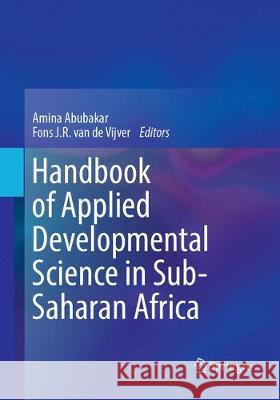Handbook of Applied Developmental Science in Sub-Saharan Africa » książka



Handbook of Applied Developmental Science in Sub-Saharan Africa
ISBN-13: 9781493984541 / Angielski / Miękka / 2018 / 417 str.
Handbook of Applied Developmental Science in Sub-Saharan Africa
ISBN-13: 9781493984541 / Angielski / Miękka / 2018 / 417 str.
(netto: 766,76 VAT: 5%)
Najniższa cena z 30 dni: 771,08
ok. 16-18 dni roboczych.
Darmowa dostawa!
Section I: Introduction.- Chapter 1. Introduction.- Section II: Social-Cultural Influences on Child Development.- Chapter 2. Parenting, Environment, and Early Child Development in Sub-Saharan Africa.- Chapter 3. Exploring Differences in the Rural Home Environment: The Role of Biological and Environmental Factors.- Chapter 4. Early Socioemotional Development of Cameroonian Nso Farmer Children.- Chapter 5. Fatherhood in the African Context: Review and a Case Study in Kenya.- Chapter 6. Sibling Care-giving and Its Implications in Sub-Saharan Africa.- Section III: Biomedical Influences on Child Development.- Chapter 7. Infections of the Central Nervous System and Child Development in Africa.- Chapter 8. The Impact of Helminth Infections on Developmental and Educational Outcomes.- Chapter 9. Diabetes in Sub-Saharan African Children: Risks, Care, and Challenges.- Chapter 10. Nutritional Influences on Child Development in Africa.- Section IV: Methodological Considerations.- Chapter 11. How to Adapt Tests for Sub-Saharan Africa.- Chapter 12. The Potential of Qualitative Research for Applied Developmental Science in Sub-Saharan Africa.- Chapter 13. Ethical Issues in Conducting Child Development Research in Sub-Saharan Africa.- Chapter 14. Doing Human Development Scholarship in Africa within the Cross-Currents of Euro-Western Intellectual Cascades.- Section V: Intervention Strategies.- Chapter 15. Potential Uses of Computer-Based Cognitive Rehabilitation Programs.- Chapter 16. A Medical Intervention for Sensitizing Caregivers (MISC): A Cross-Cultural Early Intervention.- Chapter 17. A Culturally Sensitive Approach to Promoting Initial Literacy Development in Africa.- Chapter 18. Community-Based Rehabilitation for Human Development in Sub-Saharan Africa.- Chapter 19. Education for All or Literacy for All? Evaluating Student Outcomes from Save the Children's Literacy Boost Program in Sub-Saharan Africa.- Section VI: Policy Practices.- Chapter 20. Using Research to Influence Policy and Practice: The Case of the Pathways-to-Resilience-Study, South Africa.
Amina Abubakar, Ph.D., is an Associate Professor of Psychology and Public Health at Pwani University, Kenya and a Research Fellow at the Kenya Medical Research Institute/Wellcome Trust Research Programme. She co-leads the Neuroscience research group at KEMRI-WTRP. She is also an honorary fellow at the Department of Psychiatry, University of Oxford, UK. Her main interests are in the study of developmental delays and impairments among children and adolescents exposed to various health problems such as HIV, malnutrition and malaria. A focus in her work is the development of culturally appropriate strategies for identifying, monitoring and rehabilitating at-risk children. She has (co)-authored more than 80 peer-reviewed journal articles and book chapters. She has served on technical working groups, and forums for various international organizations including the World Health Organization, National Academies of Sciences, Engineering and Medicine (USA), Save the Children, and Autism Speaks. She is actively involved in capacity building for African Scientists; she has supervised Postgraduate Diploma, Masters and PhD students in Kenya. She has also supervised PhD students from South Africa, Tanzania and Zambia.
Fons J. R. van de Vijver, Ph.D., holds a chair in cross-cultural psychology at Tilburg University, the Netherlands, and an extraordinary chair at North-West University, South Africa, and the University of Queensland, Australia. He has published more than 350 papers and chapters, mainly in the domain of cross-cultural psychology. His research focuses on bias and equivalence, psychological acculturation and multiculturalism, cognitive similarities and differences, response styles, and translations and adaptations. He supervises about 25 Ph.D. and 5 postdoctoral students. He has teaching experience in cross-cultural psychology and methods/statistics. Dr. van de Vijver has presented keynotes and invited lectures at various conferences and workshops in various countries. He is one of the most frequently cited cross-cultural psychologists in Europe.
In addition, Dr. van de Vijver has received grants from various Dutch institutions (e.g., NWO and WOTRO), European Union (e.g., Marie Curie), South African Netherlands Research Programme on Alternatives in Development, and South African National Research Foundation. He is member of several professional organizations, including the International Association for Cross-Cultural Psychology, International Association of Applied Psychology, European Association of Psychological Assessment, International Academy for Intercultural Research, and the International Test Commission.
Dr. van de Vijver is the former editor of the Journal of Cross-Cultural Psychology and serves on the board of various journals; he has evaluated manuscripts for 70 journals as ad-hoc reviewer. He has been vice-dean for research and vice-dean for education of his faculty and vice-director of Babylon, the interdisciplinary research center for studies of multicultural societies at Tilburg University. He was a former president of Division 2 (Assessment and Evaluation) of the International Association of Applied Psychology and is now President of the European Association of Psychological Assessment.
This handbook collates research evidence and presents the most up-to-date findings on child development in Sub-Saharan Africa. It discusses complex risk factors and medical conditions affecting childhood outcomes, and spotlights emerging programs for enhancing literacy and cognitive development. The panel of expert contributors offer needed context and knowledge to the discussion of previously understudied topics. Chapters present proven intervention strategies currently in use across the diverse region. In addition, this handbook provides guidelines for culturally sensitive and ethical research that will inform practice and help shape policy goals and initiatives. Topics featured in the Handbook include:
· Fatherhood in the African context.
· Sibling care-giving and its implications in Sub-Saharan Africa.
· Nutritional status, infections, and child development
· Diabetes in Sub-Saharan African children.
· How to adapt tests for Sub-Saharan Africa.· Interventions aimed at children and caregivers.
· A culturally sensitive approach to conducting research and promoting initial literacy development in Africa.
The Handbook of Applied Developmental Science in Sub-Saharan Africa is a must-have resource for researchers, professionals/scientist-practitioners, and graduate students in child, school, and developmental psychology, as well as pediatrics, social work, public health, and education.
1997-2026 DolnySlask.com Agencja Internetowa
KrainaKsiazek.PL - Księgarnia Internetowa









